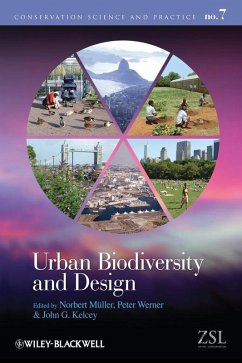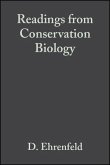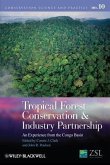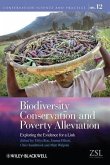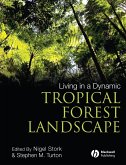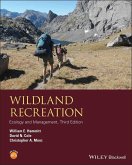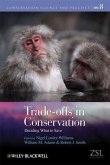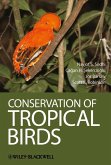Urban Biodiversity and Design (eBook, PDF)
Redaktion: Muller, Norbert; Kelcey, J. G.; Werner, P.


Alle Infos zum eBook verschenken

Urban Biodiversity and Design (eBook, PDF)
Redaktion: Muller, Norbert; Kelcey, J. G.; Werner, P.
- Format: PDF
- Merkliste
- Auf die Merkliste
- Bewerten Bewerten
- Teilen
- Produkt teilen
- Produkterinnerung
- Produkterinnerung

Hier können Sie sich einloggen

Bitte loggen Sie sich zunächst in Ihr Kundenkonto ein oder registrieren Sie sich bei bücher.de, um das eBook-Abo tolino select nutzen zu können.
With the continual growth of the world's urban population, biodiversity in towns and cities will play a critical role in global biodiversity. This is the first book to provide an overview of international developments in urban biodiversity and sustainable design. It brings together the views, experiences and expertise of leading scientists and designers from the industrialised and pre-industrialised countries from around the world. The contributors explore the biological, cultural and social values of urban biodiversity, including methods for assessing and evaluating urban biodiversity, social…mehr
- Geräte: PC
- mit Kopierschutz
- eBook Hilfe
- Größe: 7.3MB
![To Preserve Biodiversity (Readings from Conservation Biology) (eBook, PDF) To Preserve Biodiversity (Readings from Conservation Biology) (eBook, PDF)]() To Preserve Biodiversity (Readings from Conservation Biology) (eBook, PDF)60,99 €
To Preserve Biodiversity (Readings from Conservation Biology) (eBook, PDF)60,99 €![Tropical Forest Conservation and Industry Partnership (eBook, PDF) Tropical Forest Conservation and Industry Partnership (eBook, PDF)]() Tropical Forest Conservation and Industry Partnership (eBook, PDF)107,99 €
Tropical Forest Conservation and Industry Partnership (eBook, PDF)107,99 €![Biodiversity Conservation and Poverty Alleviation (eBook, PDF) Biodiversity Conservation and Poverty Alleviation (eBook, PDF)]() Biodiversity Conservation and Poverty Alleviation (eBook, PDF)64,99 €
Biodiversity Conservation and Poverty Alleviation (eBook, PDF)64,99 €![Living in a Dynamic Tropical Forest Landscape (eBook, PDF) Living in a Dynamic Tropical Forest Landscape (eBook, PDF)]() Living in a Dynamic Tropical Forest Landscape (eBook, PDF)92,99 €
Living in a Dynamic Tropical Forest Landscape (eBook, PDF)92,99 €![Wildland Recreation (eBook, PDF) Wildland Recreation (eBook, PDF)]() William E. HammittWildland Recreation (eBook, PDF)50,99 €
William E. HammittWildland Recreation (eBook, PDF)50,99 €![Trade-offs in Conservation (eBook, PDF) Trade-offs in Conservation (eBook, PDF)]() Trade-offs in Conservation (eBook, PDF)63,99 €
Trade-offs in Conservation (eBook, PDF)63,99 €![Conservation of Tropical Birds (eBook, PDF) Conservation of Tropical Birds (eBook, PDF)]() Navjot S. SodhiConservation of Tropical Birds (eBook, PDF)95,99 €
Navjot S. SodhiConservation of Tropical Birds (eBook, PDF)95,99 €-
-
-
Dieser Download kann aus rechtlichen Gründen nur mit Rechnungsadresse in A, B, BG, CY, CZ, D, DK, EW, E, FIN, F, GR, HR, H, IRL, I, LT, L, LR, M, NL, PL, P, R, S, SLO, SK ausgeliefert werden.
- Produktdetails
- Verlag: Wiley
- Seitenzahl: 648
- Erscheinungstermin: 22. Februar 2010
- Englisch
- ISBN-13: 9781444318661
- Artikelnr.: 37357119
- Verlag: Wiley
- Seitenzahl: 648
- Erscheinungstermin: 22. Februar 2010
- Englisch
- ISBN-13: 9781444318661
- Artikelnr.: 37357119
- Herstellerkennzeichnung Die Herstellerinformationen sind derzeit nicht verfügbar.
Foreword xv
Preface xvii
Introduction 1
1 Urban Biodiversity and the Case for Implementing the Convention on
Biological Diversity in Towns and Cities 3
Norbert Müller and Peter Werner
Fundamentals of Urban Biodiversity 35
2 Biodiversity of Urban-Industrial Areas and its Evaluation - a Critical
Review 37
Rüdiger Wittig
3 Cultural Aspects of Urban Biodiversity 56
Andy Millard
4 Social Aspects of Urban Biodiversity - an Overview 81
Sarel Cilliers
5 Urban Biodiversity and Climate Change 101
David J. Nowak
6 Design and Future of Urban Biodiversity 118
Maria Ignatieva
7 Urban Patterns and Biological Diversity: A Review 145
Peter Werner and Rudolf Zahner
History and Development of Urban Biodiversity 175
8 Urban Flora: Historic, Contemporary and Future Trends 177
Philip James
9 Environmental History and Urban Colonizations from an Avian Perspective
191
Timo Vuorisalo
10 Constraints of Urbanization on Vegetation Dynamics in a Growing City: A
Chronological Framework in Rennes (France) 206
Vincent Pellissier, Françoise Roze and Phillipe Clergeau
11 Most Frequently Occurring Vascular Plants and the Role of Non-native
Species in Urban Areas - a Comparison of Selected Cities in the Old and the
New Worlds 227
Norbert Müller
12 Factors Influencing Non-Native Tree Species Distribution in Urban
Landscapes 243
Wayne C. Zipperer
Analysis and Evaluation of Biodiversity in Cities 253
13 Towards an Automated Update of Urban Biotope Maps Using Remote Sensing
Data: What is Possible? 255
Mathias Bochow, Theres Peisker, Sigrid Roessner, Karl Segl and Hermann
Kaufmann
14 Analysis of the Planted and Spontaneous Vegetation at Selected Open
Spaces in Apipucos District of Recife, Brazil 273
Dietmar Sattler, Simone Schmidt and Marccus Vinicius da Silva Alves
15 Multivariate Approaches to the Study of Urban Biodiversity and
Vegetation: An Example from a Southern Temperate Colonial City,
Christchurch, New Zealand 291
Glenn H. Stewart, Maria Ignatieva and Colin D. Meurk
16 The Biodiversity of Historic Domestic Gardens - A Study in the
Wilhelminian Quarter of Erfurt (Germany) 309
Norbert Müller
17 Old Masonry Walls as Ruderal Habitats for Biodiversity Conservation and
Enhancement in Urban Hong Kong 323
C.Y. Jim
18 Green Roofs - Urban Habitats for Ground-Nesting Birds and Plants 348
Nathalie Baumann and Friederike Kasten
19 South Atlantic Tourist Resorts: Predictors for Changes Induced by
Afforestation 363
Ana Faggi, Pablo Perepelizin and Jose R. Dadon
Social Integration and Education for Biodiversity 381
20 Urban Green Spaces: Natural and Accessible? The Case of Greater
Manchester, UK 383
Aleksandra Kázmierczak, Richard Armitage and Philip James
21 UrbanWastelands -A Chance for Biodiversity in Cities? Ecological
Aspects, Social Perceptions and Acceptance of Wilderness by Residents 406
Juliane Mathey and Dieter Rink
22 Perception of Biodiversity - The Impact of School Gardening 425
Dorothee Benkowitz and Karlheinz Köhler
23 Landscape Design and Children's Participation in a Japanese Primary
School - Planning Process of School Biotope for 5 Years 441
Keitaro Ito, Ingunn Fjortoft, Tohru Manabe, Kentaro Masuda, Mahito Kamada
and Katsunori Fujiwara
24 Attracting Interest in Urban Biodiversity with Bird Studies in Italy 454
Marco Dinetti
25 Allotment Gardens as Part of Urban Green Infrastructure: Actual Trends
and Perspectives in Central Europe 463
Jürgen H. Breuste
Conservation, Restoration and Design for Biodiversity 477
26 Integration ofNatural Vegetation in Urban Design - Information, Personal
Determination and Commitment 479
Clas Florgård
27 Prospects of Biodiversity in the Mega-City of Karachi, Pakistan:
Potentials, Constraints and Implications 497
Salman Qureshi and Jürgen H. Breuste
28 Potential of Biodiversity and Recreation in Shrinking Cities:
Contextualization and Operationalization 518
Dagmar Haase and Sophie Schetke
29 Near-Natural Restoration Strategies in Post-mining Landscapes 539
Anita Kirmer and Sabine Tischew
30 Restoration and Design of Calcareous Grasslands in Urban and Suburban
Areas: Examples from the Munich Plain 556
Christine Joas, Johannes Gnädinger, Klaus Wiesinger, Rüdiger Haase and
Kathrin Kiehl
31 Contribution of Landscape Design to Changing Urban Climate Conditions
572
Katrin Hagen and Richard Stiles
32 Economics and the Convention on Biodiversity: Financial Incentives for
Encouraging Biodiversity in Nagoya 593
Ryo Kohsaka
Conclusions 608
Norbert Müller, Peter Werner and John G. Kelcey
Index 611
Foreword xv
Preface xvii
Introduction 1
1 Urban Biodiversity and the Case for Implementing the Convention on
Biological Diversity in Towns and Cities 3
Norbert Müller and Peter Werner
Fundamentals of Urban Biodiversity 35
2 Biodiversity of Urban-Industrial Areas and its Evaluation - a Critical
Review 37
Rüdiger Wittig
3 Cultural Aspects of Urban Biodiversity 56
Andy Millard
4 Social Aspects of Urban Biodiversity - an Overview 81
Sarel Cilliers
5 Urban Biodiversity and Climate Change 101
David J. Nowak
6 Design and Future of Urban Biodiversity 118
Maria Ignatieva
7 Urban Patterns and Biological Diversity: A Review 145
Peter Werner and Rudolf Zahner
History and Development of Urban Biodiversity 175
8 Urban Flora: Historic, Contemporary and Future Trends 177
Philip James
9 Environmental History and Urban Colonizations from an Avian Perspective
191
Timo Vuorisalo
10 Constraints of Urbanization on Vegetation Dynamics in a Growing City: A
Chronological Framework in Rennes (France) 206
Vincent Pellissier, Françoise Roze and Phillipe Clergeau
11 Most Frequently Occurring Vascular Plants and the Role of Non-native
Species in Urban Areas - a Comparison of Selected Cities in the Old and the
New Worlds 227
Norbert Müller
12 Factors Influencing Non-Native Tree Species Distribution in Urban
Landscapes 243
Wayne C. Zipperer
Analysis and Evaluation of Biodiversity in Cities 253
13 Towards an Automated Update of Urban Biotope Maps Using Remote Sensing
Data: What is Possible? 255
Mathias Bochow, Theres Peisker, Sigrid Roessner, Karl Segl and Hermann
Kaufmann
14 Analysis of the Planted and Spontaneous Vegetation at Selected Open
Spaces in Apipucos District of Recife, Brazil 273
Dietmar Sattler, Simone Schmidt and Marccus Vinicius da Silva Alves
15 Multivariate Approaches to the Study of Urban Biodiversity and
Vegetation: An Example from a Southern Temperate Colonial City,
Christchurch, New Zealand 291
Glenn H. Stewart, Maria Ignatieva and Colin D. Meurk
16 The Biodiversity of Historic Domestic Gardens - A Study in the
Wilhelminian Quarter of Erfurt (Germany) 309
Norbert Müller
17 Old Masonry Walls as Ruderal Habitats for Biodiversity Conservation and
Enhancement in Urban Hong Kong 323
C.Y. Jim
18 Green Roofs - Urban Habitats for Ground-Nesting Birds and Plants 348
Nathalie Baumann and Friederike Kasten
19 South Atlantic Tourist Resorts: Predictors for Changes Induced by
Afforestation 363
Ana Faggi, Pablo Perepelizin and Jose R. Dadon
Social Integration and Education for Biodiversity 381
20 Urban Green Spaces: Natural and Accessible? The Case of Greater
Manchester, UK 383
Aleksandra Kázmierczak, Richard Armitage and Philip James
21 UrbanWastelands -A Chance for Biodiversity in Cities? Ecological
Aspects, Social Perceptions and Acceptance of Wilderness by Residents 406
Juliane Mathey and Dieter Rink
22 Perception of Biodiversity - The Impact of School Gardening 425
Dorothee Benkowitz and Karlheinz Köhler
23 Landscape Design and Children's Participation in a Japanese Primary
School - Planning Process of School Biotope for 5 Years 441
Keitaro Ito, Ingunn Fjortoft, Tohru Manabe, Kentaro Masuda, Mahito Kamada
and Katsunori Fujiwara
24 Attracting Interest in Urban Biodiversity with Bird Studies in Italy 454
Marco Dinetti
25 Allotment Gardens as Part of Urban Green Infrastructure: Actual Trends
and Perspectives in Central Europe 463
Jürgen H. Breuste
Conservation, Restoration and Design for Biodiversity 477
26 Integration ofNatural Vegetation in Urban Design - Information, Personal
Determination and Commitment 479
Clas Florgård
27 Prospects of Biodiversity in the Mega-City of Karachi, Pakistan:
Potentials, Constraints and Implications 497
Salman Qureshi and Jürgen H. Breuste
28 Potential of Biodiversity and Recreation in Shrinking Cities:
Contextualization and Operationalization 518
Dagmar Haase and Sophie Schetke
29 Near-Natural Restoration Strategies in Post-mining Landscapes 539
Anita Kirmer and Sabine Tischew
30 Restoration and Design of Calcareous Grasslands in Urban and Suburban
Areas: Examples from the Munich Plain 556
Christine Joas, Johannes Gnädinger, Klaus Wiesinger, Rüdiger Haase and
Kathrin Kiehl
31 Contribution of Landscape Design to Changing Urban Climate Conditions
572
Katrin Hagen and Richard Stiles
32 Economics and the Convention on Biodiversity: Financial Incentives for
Encouraging Biodiversity in Nagoya 593
Ryo Kohsaka
Conclusions 608
Norbert Müller, Peter Werner and John G. Kelcey
Index 611
